 Petzlover
Petzlover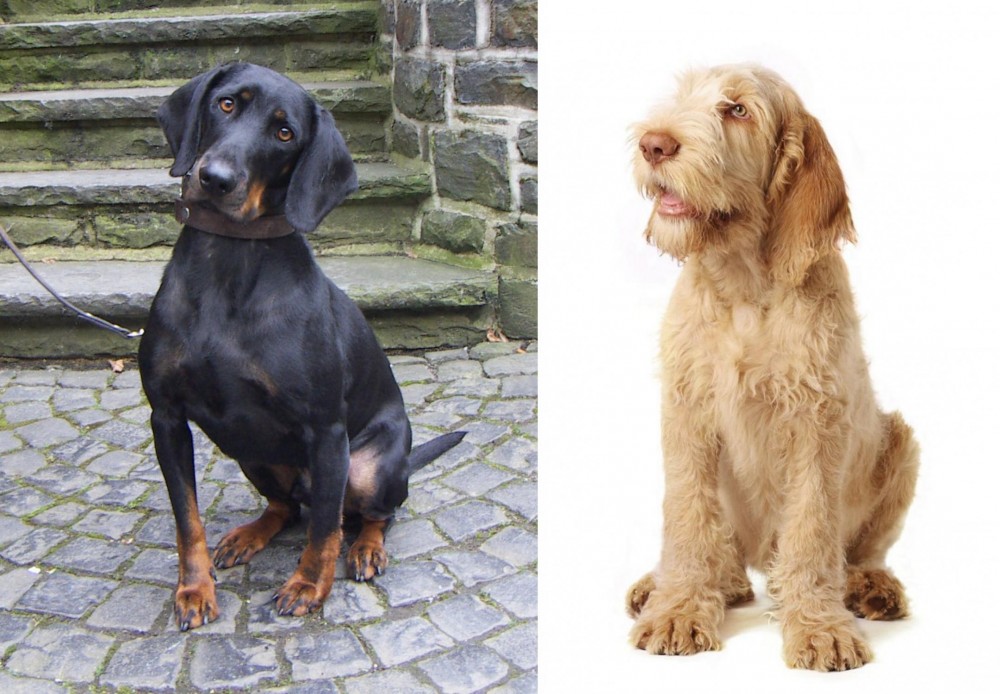 Austrian Black and Tan Hound is originated from Austria but Spinone Italiano is originated from Italy. Austrian Black and Tan Hound may grow 14 cm / 5 inches shorter than Spinone Italiano. Austrian Black and Tan Hound may weigh 9 kg / 19 pounds lesser than Spinone Italiano. Austrian Black and Tan Hound may live 6 years more than Spinone Italiano. Austrian Black and Tan Hound may have less litter size than Spinone Italiano. Austrian Black and Tan Hound requires High Maintenance. But Spinone Italiano requires Moderate Maintenance
Austrian Black and Tan Hound is originated from Austria but Spinone Italiano is originated from Italy. Austrian Black and Tan Hound may grow 14 cm / 5 inches shorter than Spinone Italiano. Austrian Black and Tan Hound may weigh 9 kg / 19 pounds lesser than Spinone Italiano. Austrian Black and Tan Hound may live 6 years more than Spinone Italiano. Austrian Black and Tan Hound may have less litter size than Spinone Italiano. Austrian Black and Tan Hound requires High Maintenance. But Spinone Italiano requires Moderate Maintenance
 When Celts began settling in Western Europe, they brought their dogs along. The Celtic Hounds had a duty to hunt, guard and fight in battles. They were, most likely, the ancestors of breeds like Greyhounds and Irish Wolfhounds. The original Austrian black and tan hound was created in Austria during the late nineteenth century. They were very specific dog breed because of their sharp nose, agility, speed, trainability and extraordinary persistence while hunting or tracking.
When Celts began settling in Western Europe, they brought their dogs along. The Celtic Hounds had a duty to hunt, guard and fight in battles. They were, most likely, the ancestors of breeds like Greyhounds and Irish Wolfhounds. The original Austrian black and tan hound was created in Austria during the late nineteenth century. They were very specific dog breed because of their sharp nose, agility, speed, trainability and extraordinary persistence while hunting or tracking.
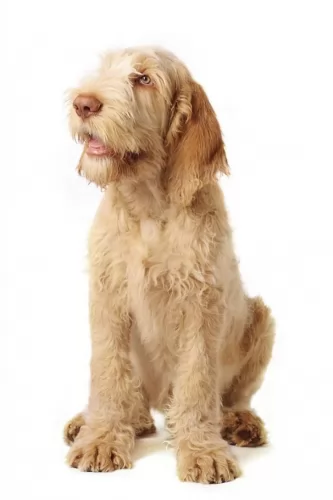 This Italian breed has an ancient blood line tracing all the back to 500 BC. Originally bred to hunt, he is today a friendly, alert and loyal companion. He is intelligent enough to do any job you give him. The Spinone is thought to be one of the oldest gun dogs ever, but it is not entirely clear that he came from Italy. There are some who think he may have come from somewhere in these European countries – Italy, Greece, France, Celtic Ireland, Spain or Russia. However, most believe the breed came from Italy in the Piedmont area.
This Italian breed has an ancient blood line tracing all the back to 500 BC. Originally bred to hunt, he is today a friendly, alert and loyal companion. He is intelligent enough to do any job you give him. The Spinone is thought to be one of the oldest gun dogs ever, but it is not entirely clear that he came from Italy. There are some who think he may have come from somewhere in these European countries – Italy, Greece, France, Celtic Ireland, Spain or Russia. However, most believe the breed came from Italy in the Piedmont area.
The most common thinking is that he is a descendent of the Spanish Pointer and/or the Russian Setter. One other theory is that setters from Greece were brought to the Roman Empire and crossed with a variety of Italian dog to make the coarse haired Spinone we see today. Then the French put in their claim that the breed is a cross of many French pointers.
The theory that counts might just belong to the Italians who believe the ancestor to the Spinone includes the German Wirehaired Pointer, the Pudelpointer and the Wirehaired Pointer. It was not until the 19th century that the name Spinone was officially given to the breed.
Before that it might have been known as a Spinoso and named after a thorn bus in Italy called the Spino. This bush was so thick and sharp that small prey animals learned to hide under it because the predators could not get through it. The Spinone however was able to fight through the briars with its thick, coarse hair and tough skin.
The breed almost became extinct during the second world war as before and after the hunters in Italy had started to use other breeds for hunting. Breeders also began to cross the Spinone with wire hairs like German Wirehaired Pointer, the Wirehaired Pointing Griffon and the Boulet.
The most popular hunting dog in Italy today is the Bracco Italiano while the Spinone is still used for hunting.
 The Austrian black and tan hound is one of the larger dog breeds. The coat colour of this breed is unique: the coat must be black with small and defined fawn markings. The body, head and legs are black, with dark or fawn markings with the fawn marks above the eyes.
The Austrian black and tan hound is one of the larger dog breeds. The coat colour of this breed is unique: the coat must be black with small and defined fawn markings. The body, head and legs are black, with dark or fawn markings with the fawn marks above the eyes.
The Black and Tan is a smooth coated, slim breed with the broad chest and a wide skull shape. Their teeth meet in a scissor bite. They don’t have very long ears and their tail is long and slightly bent.
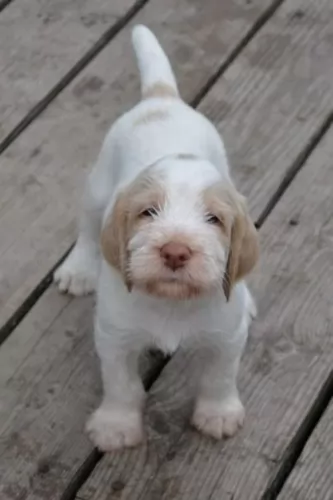 The breed is made up of strong, solid and muscled dogs that have an almost square build. His legs are made to travel any terrain and his head is long with an occipital that is pronounced and unique to the Spinone. They are said to have “human appearing eyes”, with a docked tail in countries allowing it and webbed paws.
The breed is made up of strong, solid and muscled dogs that have an almost square build. His legs are made to travel any terrain and his head is long with an occipital that is pronounced and unique to the Spinone. They are said to have “human appearing eyes”, with a docked tail in countries allowing it and webbed paws.
Shorter hair covers their feet, head, legs, muzzle and ears. They have longer hair on their eyebrows and it is stiff, with soft hair on the muzzle and cheeks with a beard and mustache. It is a single coated dog though the coat is rough. They should have skin, lips, nose, and pads in colors that coordinate with their coats. For white dog it is a red-orange color, brown in dogs that are roan colored and dark red-orange in the orange and white colored dog.
 The Austrian Black and Tan Hound get along well with strangers, other dogs or any animals. If they are not trained, their instinct to hunt will be a problem for other, smaller dogs and small animals. This is why this breed can’t be a guard dog. He is usually very friendly, and he remains friendly in most situations. It is very easy to train and socialize them, but you must remain firm while teaching them right from wrong. They are not the breed for the indoor, apartments or senior citizens. If you are not able to fulfil his daily need for activity, he can become quite destructive.
The Austrian Black and Tan Hound get along well with strangers, other dogs or any animals. If they are not trained, their instinct to hunt will be a problem for other, smaller dogs and small animals. This is why this breed can’t be a guard dog. He is usually very friendly, and he remains friendly in most situations. It is very easy to train and socialize them, but you must remain firm while teaching them right from wrong. They are not the breed for the indoor, apartments or senior citizens. If you are not able to fulfil his daily need for activity, he can become quite destructive.
Nonexistent for the last 30 years. But, if the dog gets mistreated, neglected or threatened – this breed knows to be aggressive. But, if you are a good and loving owner who makes sure that your dog is well raised, fed, loved, trained and socialized while he is still a pup, you will have no reason for the fear.
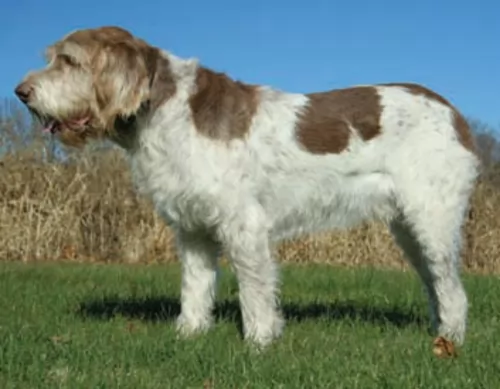 3.Adaptability – Young dogs need a lot of attention but they don’t need a lot of space. The young dogs are energetic while the adult dogs are laid-back. They need exercise every day and at least a small back yard.
3.Adaptability – Young dogs need a lot of attention but they don’t need a lot of space. The young dogs are energetic while the adult dogs are laid-back. They need exercise every day and at least a small back yard.
 (hip or elbow joint malformation) can happen from injury or overuse of the joints since the Austrian black and tan hound is a runner and jumper.
(hip or elbow joint malformation) can happen from injury or overuse of the joints since the Austrian black and tan hound is a runner and jumper.
They have sensitive ears and they can suffer from ear infections. To avoid this, you must have regular vet checks and have a habit of regular cleaning - hygiene of their ears.
Caused by Demodex canis. If you notice hair loss, redness and scaling you must take your pet to the vet urgently since this disease can be transmitted humans.
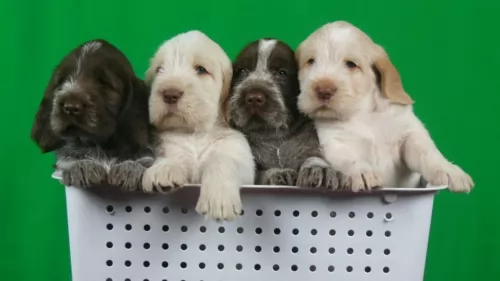 This is an ancient breed with not a lot of documented genetic issues, but it does have one deadly condition.
This is an ancient breed with not a lot of documented genetic issues, but it does have one deadly condition.
• Cerebellar ataxia (CA) is inherited and hits the puppies. Because it is a recessive gene both the mother and father must carry it for the puppy to inherit it. This makes it less likely than it would be otherwise. Puppies with the condition do not live more than a year. Since it is a genetic problem there is now a test for it that identifies carriers at a 95% accuracy rate.
• Like many other large breed dogs, they are susceptible to hip dysplasia. This can cause arthritis and/or lameness. There are now hip replacement surgeries available for this condition.
• Bloat is again common in large dogs and you need to watch for it with the Spinone. It can be deadly if not treated immediately. Let your dog rest quietly after eating. Do not let her exercise or play energetically after eating.
 Austrian Black and Tan Hounds don’t eat a lot even if you might think that they do. The truth is that they won’t need more than the prescribed portions that can be found in the instructions of high-quality dry dog food per day. All you have to do is make sure they have 3 meals during the day until they are 6 months old, and later they can settle for two meals per day.
Austrian Black and Tan Hounds don’t eat a lot even if you might think that they do. The truth is that they won’t need more than the prescribed portions that can be found in the instructions of high-quality dry dog food per day. All you have to do is make sure they have 3 meals during the day until they are 6 months old, and later they can settle for two meals per day.
Don’t give them the freedom to eat as much as they want. That can cause serious health complications. Their stomachs won’t be able to digest human food because it is usually made with a lot of spices. You can feed them with treats like eggs, fresh cheese, fruits and vegetables are okay as treats but only if these treats make less than 10% of their daily portion.
This playful dog needs the daily dose of outside activities. The grooming is easy but it must be regular. Once-a-week brushing at least is necessary. They don’t need to be bathed regularly but you must check their skin conditions daily since they have high risks of skin diseases. Nails need to be trimmed since they grow too fast and ears need to be cleaned every day to avoid ear infections.
The Austrian Black and Tan Hound are like any hound: they have an excellent sense of smell and they love to explore. They like to run and they can run for miles. Any outside activity will be a good choice. They like to bark and they bark even when they are happy. They are usually friendly towards strangers and other dogs, so the dog park is a good choice as well. They will love being at playgrounds as well since they love children and they can be a great Frisbee partner.
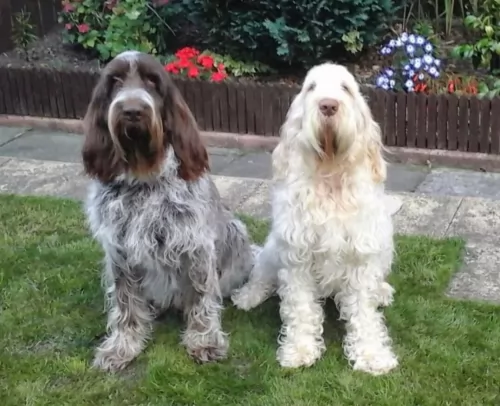 1Feeding the puppy – feed a high quality dog food for puppies of large breeds. Feed 3-4x day but don’t overfeed or let him exercise after eating even as a puppy.
1Feeding the puppy – feed a high quality dog food for puppies of large breeds. Feed 3-4x day but don’t overfeed or let him exercise after eating even as a puppy.
2.Feeding the adult - feed a high quality dog food for large breeds. Feed 1-2X day but don’t overfeed or let him exercise after eating.
4. Games and Exercises – The Spinone is an active breed, but not a fast dog. In fact, they like to travel at a trot so it becomes a great dog for jogging or running with. They love to jump, track, hunt, hike. They do well with agility, retrieving, flyball, carting, being a therapy dog, a rescue dog and a watchdog.